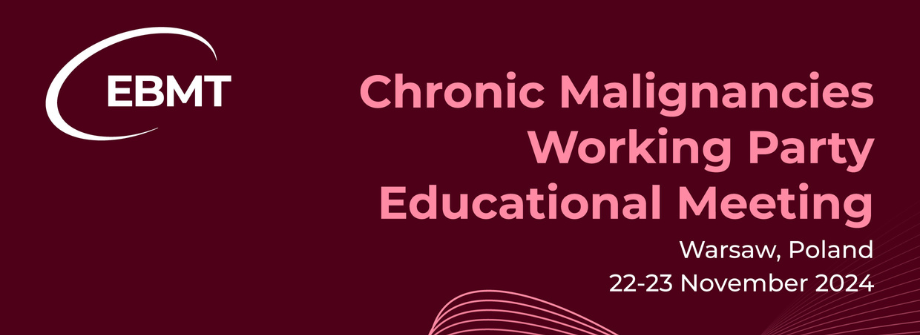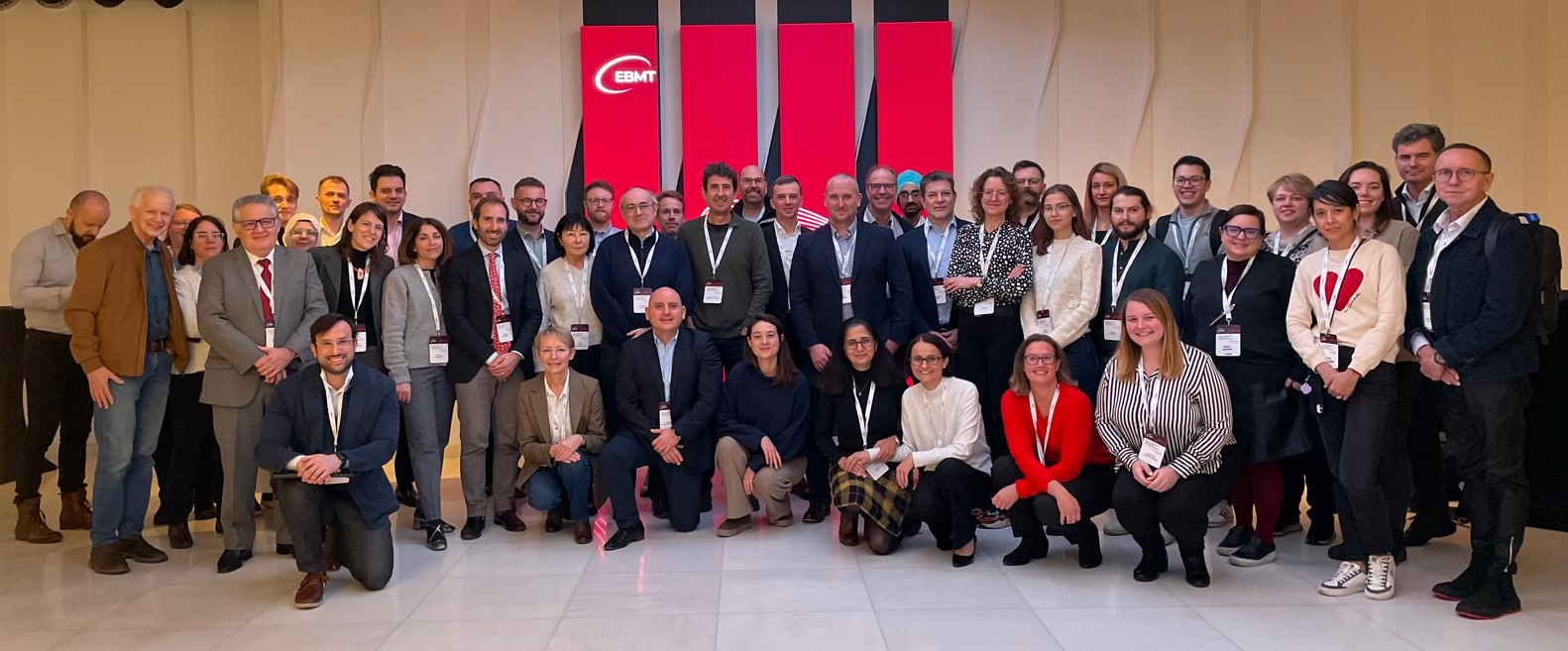
Optimization of Allogeneic Hematopoietic Cell Transplantation (HCT) for MDS, MPN, and MDS/MPN Overlap Syndromes
Summary report written by Esra Gülderen, Alex Rampotas, Joanna Drozd-Sokolowska, Kavita Raj and Donal McLornan.
The Chronic Malignancies Working Party (CMWP) of the EBMT convened a highly productive meeting in Warsaw focused on optimising allogeneic hematopoietic cell transplantation (HCT) for myelodysplastic syndromes (MDS), myeloproliferative neoplasms (MPN), and MDS/MPN overlap syndromes. The CMWP Business meeting was held on 22nd November, co-chaired by the WP secretaires Dr. Joanna Drozd-Sokolowska (local Host Warsaw) and Dr Kavita Raj (London), where, for each subcommittee, progress and plans were reviewed and new studies considered for inclusion on the portfolio.

Educational Program
Dr. Donal McLornan, Chair of the CMWP, introduced the educational program, in addition taking the opportunity to outline the Working Party's structure, achievements, and ongoing projects to set the scene for an exciting day of state-of -the art updates across the spectrum of MDS, MPN and overlap syndromes.
Session 1: Allogeneic HCT for MDS in 2024
Dr. Joanna Drozd-Sokolowska opened the first session by providing an insightful overview of the classification of MDS in 2024. She discussed the practical differences between the ICC and WHO classification systems, noting significant discordance between both and the potential challenges this can pose for allo-HCT decisions; transplant decisions are primarily based on risk stratification rather than classification alone. Dr. Drozd-Sokolowska emphasized the potential for molecular taxonomy to enhance current risk stratification, helping to identify high-risk MDS patients who could benefit from allo-HCT—a key unmet need in current clinical practice.
Dr. Grzegorz Basak followed with a discussion on using the IPSS-Molecular (IPSS-M) model to guide allo-HCT decisions for MDS. He raised several critical questions, including how best to identify which patients will benefit most from allo-HCT in 2024 and beyond and how best to modify transplant platforms for patients at risk of poor outcomes. Dr. Basak emphasized that while the IPSS-M significantly improves predictions of relapse-free survival (RFS) and overall survival, very high-risk patients still face poor transplant outcomes. He additionally discussed the modelling decision analysis for allo-HCT on IPSS-M versus conventional Revised IPSS (IPSS-R).
Next, Dr. Carmelo Gurnari addressed the importance of considering germline predispositions in MDS patients undergoing allo-HCT. He stressed the need for genetic counselling, multidisciplinary care, and individualized therapeutic approaches for such patients, particularly in the context of donor selection and transplant timing.
Dr. Kavita Raj, CMWP Co-Secretary, delivered a compelling talk on approaching the challenging question of transplant in TP53-mutant MDS. She highlighted that while patients with monoallelic TP53 mutations have, in general, similar outcomes to those with wild-type TP53, most biallelic TP53-mutant patients, especially those with a complex karyotype, have dismal outcomes. Only a small proportion of these patients are currently eligible for transplant and have a successful outcome. Dr. Raj emphasized the need for better peri-transplant strategies in this high-risk subgroup and a refocus on clinical trials in this area.
Dr. Krzysztof Madry next discussed integrating novel agents into MDS allo-HCT algorithms, particularly focusing on the role of novel agents in conditioning regimens, in the post-transplant settings, and optimal strategies to reduce relapse risk. Finally, Dr. Angela Consagra concluded the session with a case study on the management of TP53-mutant MDS, showcasing successful allo-HCT followed by post-transplant salvage therapy with azacytidine and donor lymphocyte infusion (DLI) leading to complete remission.
Session 2: Improving Allo-HCT Outcomes for MPN
The second session, chaired by Drs. Juan Carlos Hernandez Boluda and Donal McLornan, focused on improving allo-HCT outcomes for MPN. Dr. Juan Carlos Hernandez Boluda discussed optimization of graft-versus-host disease (GVHD) prophylaxis in myelofibrosis (MF) allo-HCT. Despite improved results in recent years, grade III-IV acute GVHD and severe chronic GVHD still significantly increase non-relapse mortality (NRM) and can limit transplant success. He discussed current and future strategies, including a review of the use of PTCy across donor types.
Next, Dr. Moniek de Witte presented novel results on the role of ex vivo αβT-cell depletion in MF allo-HCT, demonstrating promising outcomes with less GVHD and improved PFS. Dr. Tomas Czerw then reviewed the EBMT study on haploidentical transplantation for MF, the largest study to date, highlighting no significant differences in transplant survival outcomes based on graft source (PB versus BM). However, higher CD34+ cell doses in PB-derived stem cells associated with faster neutrophil engraftment. Haploidentical transplants remain a viable option in MF allo-HCT, especially for ethnic minorities who may currently be underrepresented in donor registries.
Dr. Giorgia Battipaglia addressed the critical unmet need for better management of poor graft function and relapse in MF allo-HCT, emphasizing the importance of early diagnosis to improve outcomes. She highlighted the need for harmonization in developing optimal relapse management strategies and international collaborative studies are ongoing.
Dr. Nicola Polverelli provided a detailed overview of allo-HCT for “atypical” (non-classical) MPN and MDS/MPN, such as Chronic Neutrophilic Leukaemia, MPN-Not Otherwise Specified (NOS) etc, emphasizing the importance of harmonisation of approaches and the considerable knowledge gaps that exist across these entities. He called for standardized protocols and international trials to shape future practice and will soon publish EBMT based guidelines addressing this topic.
Dr. Nico Gagelmann discussed the use of DLI in MF allo-HCT, recommending close monitoring, early reduction of immunosuppression for minimal residual disease (MRD) positive patients, and early DLI for relapse prevention.
Dr. Alex Rampotas closed the session with an exciting , state-of- the- art update on novel CAR-T cell therapy for calreticulin (CALR)-mutated MF. This innovative approach is progressing to a first-in-human clinical trial in the near future and could change the MF treatment paradigm.
Session 3: Improving Patient and Caregiver Satisfaction in Treatment Decisions for MDS and MPN
The third session, chaired by Prof. Fernando Barosso Duarte and the EBMT lead WP nurse specialist Maaike de Ruijter, focused on improving patient and caregiver satisfaction in treatment decisions for MDS and MPN.
Dr. Esra Gülderen opened the session with a fascinating and thought provoking talk on incorporating patient preferences into clinical trial design for novel agents in MDS and MPN. She expertly discussed the importance of patient-reported outcomes (PROs) and the need for patient-centric clinical trial designs, highlighting the history, current recommendations, and potential future developments in this area. This was followed by a fantastic talk from Sara Pettersen highlighting her teams innovative work focussed on patient centric home delivery of chemotherapy with a focus on azacytidine and how this can improve patients day to day experiences and Quality of Life. Many practical points were considered and the audience were super interested in how they could adapt such approaches within their centres.
Session 4: Optimizing Outcomes for MDS/MPN overlap syndromes
The concluding session, chaired by Drs Francesco Onida and Katja Sockel, focussed on MDS/MPN overlap syndromes. Dr Donal McLornan opened the session with a talk focused on MDS/MPN-NOS and discussed why ‘streamlining our approach to the unclassifiable’ was important. He also updated the audience on the importance of molecular annotation to guide treatment decisions and highlighted current clinical trials in this arena (ABNL-MARRO 001 study across the spectrum of overlap syndromes). Next Dr Katja Sockel addressed novel approaches to therapy in CMML, highlighting both successes and failures and addressing future directions in the field, including immunotherapeutic approaches. Next we had a focus on CMML with two talks from Dr. Francesco Onida and Prof. Fernando Barosso Duarte (President SBTMO, Brazil), highlighting current allo-HCT outcomes in CMML and how these may be improved given the considerable relapse rates that challenge transplant success. Lastly, we were privileged to have Dr. Gonzalo Bentolila from Buenos Aires, Argentina deliver an excellent case presentation summary on optimisation of haploidentical allo-HCT in MF.
Conclusion
The meeting in Warsaw was a tremendous success, fostering lively discussions and collaborations among faculty and attendees. We would like to thank all members of the faculty, the WP, attendees, the events team and the amazing Leiden Study Unit data management and statistics team. There is significant enthusiasm for future international studies and the continued advancement of transplant strategies in MDS, MPN, and MDS/MPN overlap syndromes. The CMWP looks forward to its next business and educational meetings in Rome, scheduled for September 2025, where it will join forces with colleagues from the Autoimmune Diseases Working Party for an exciting and innovative program.
We hope to see you there!